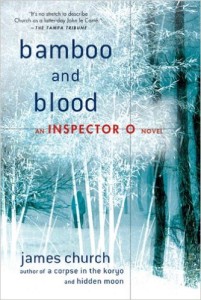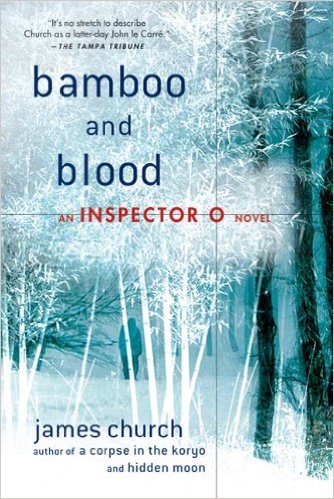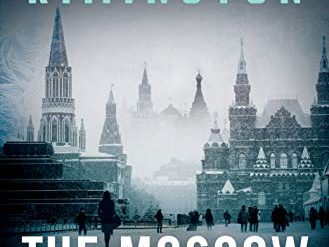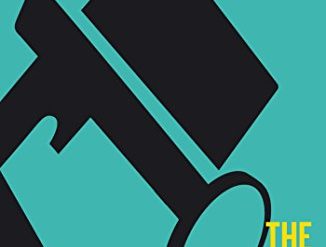
James Church’s Bamboo and Blood is one of the most unusual detective novels you’ll ever come across. Opening during the devastaing North Korean famine of 1997, the story revolves around the hapless Inspector O and his unhappy boss, Chief Inspector Pak of the Ministry of Public Security, described in the novel as the police. Kim Jong-Il stepped into his father’s shoes as dictator upon the old man’s death only three years earlier, and the Communist Party and the Army are still vying for ascendancy in the power dynamics of the North Korean state.
Estimated reading time: 4 minutes
Meanwhile, the most brutal famine in the country’s history is underway: “classes were held only sporadically, with so many teachers too weak or tired to lecture, and the students too hungry to concentrate. . . Pyongyang was awash in rumors, most of them true, about how conditions in the countryside had fallen apart. We were ripe for something, I just didn’t know what.”
Bamboo and Blood (Inspector O #3) by James Church ★★★☆☆
An investigation rife with uncertainty and confusion
Like the two novels that preceded it in the Inspector O series, the dominant theme in Bamboo and Blood is ambiguity. Characters, roles, circumstances — everything is awash in confusion and uncertainty. When Inspector O is assigned to investigate the circumstances of a young woman’s murder — in Pakistan? the U.S.? somewhere else: it’s unclear — he discovers that her personnel file has disappeared. He picks up hints of her life from a friend at the university and from the woman’s father, a retired air force general. But there’s no proof that she was murdered, much less where the alleged event took place.
Meanwhile, Inspector O’s investigation is interrupted when he receives unwanted orders to meet a foreigner at the airport and escort him around Pyongyang for the duration his stay. The foreigner may be Swiss or Hungarian, he may be Jewish, even possibly Israeli. The murder investigation is sidetracked as Inspector O’s life comes to be dominated by the unpredictable actions of the foreigner.
When a high-ranking Party official orders him to fly to Geneva to observe North Korea’s negotiations with the United States, probably having something to do with missiles, it’s a certainty that the foreigner will turn up again. And even though this appears to be clear, there are other surprises in store, as two mysterious individuals from O’s past turn up in the course of his work. Unlike its two predecessors in the series, Bamboo and Blood goes overboard on the confusion and uncertainty. The novel would be more rewarding to read if at least a few things were much clearer.
The great North Korean famine
It is historical fact that Kim Jong Il, father of North Korea’s current dictator, Kim Jong-Un, was named Leader in 1994. (He remained in the post until his death in 2011.) The economic crisis that began in the final years of the dictatorship headed by their father and grandfather, Kim Il-Sung, lasted for the four-year period 1994-98. In its wake came a severe and widespread famine that killed an enormous number of North Korean citizens, estimated at anywhere from 240,000 to 3,500,000. (The country’s population was then around just 22 million.) Wikipedia describes the causes of the famine as follows: “Economic mismanagement and the loss of Soviet support caused food production and imports to decline rapidly. A series of floods and droughts exacerbated the crisis. The North Korean government and its centrally-planned system proved too inflexible to effectively curtail the disaster.”
About the author
James Church is the pen name of a man described as “a former Western intelligence officer” with intimate knowledge of Asia. Asian specialists who have read any of the five novels in the Inspector O series have praised the nuanced pictured he paints of life under the North Korean dictatorship.
For related reading
You might also enjoy my posts:
- Top 10 mystery and thriller series
- 20 excellent standalone mysteries and thrillers
- 30 outstanding detective series from around the world
- Top 20 suspenseful detective novels
- Top 10 historical mysteries and thrillers
And you can always find my most popular reviews, and the most recent ones, on the Home Page.



























